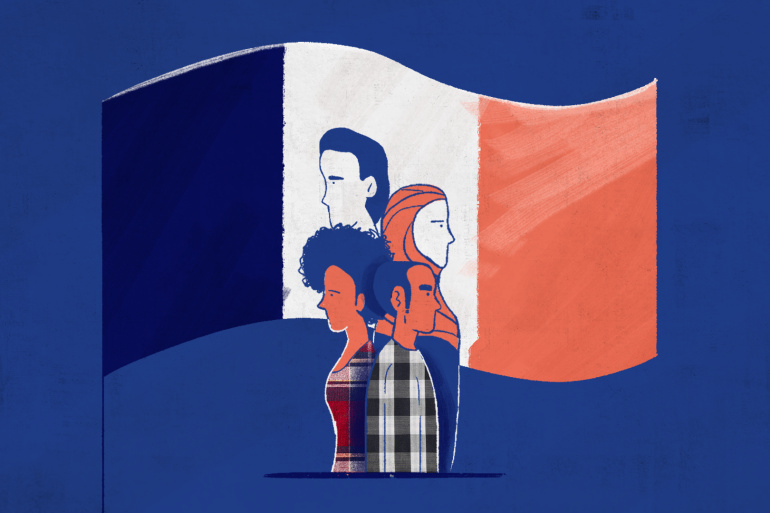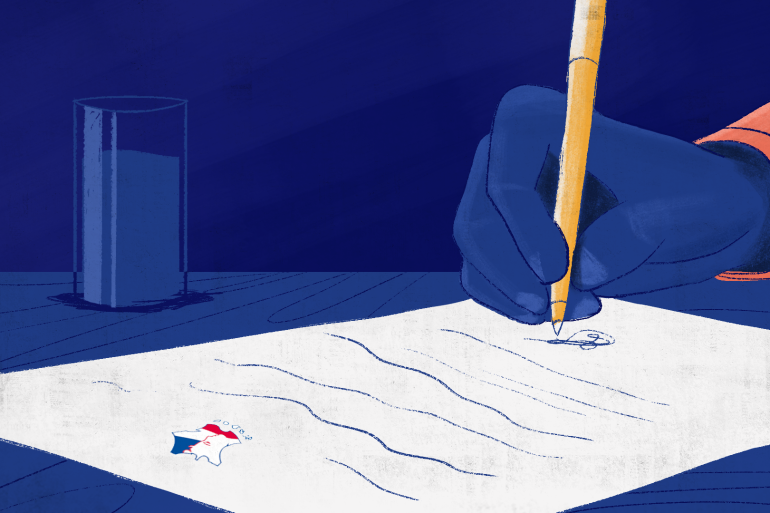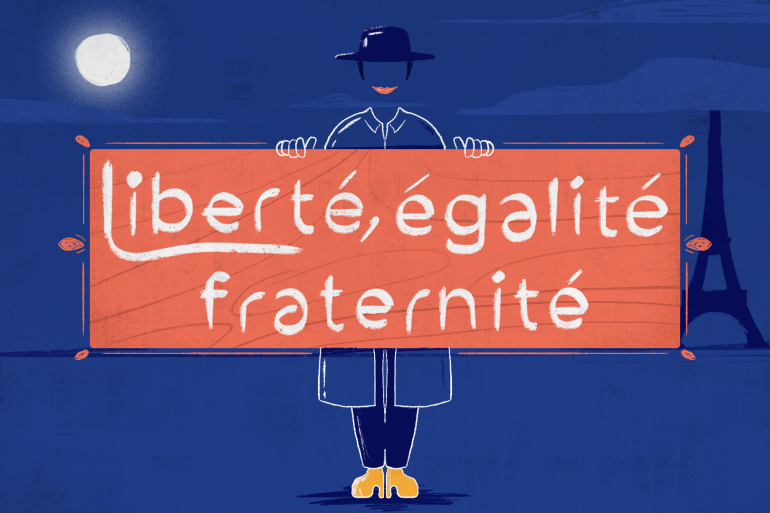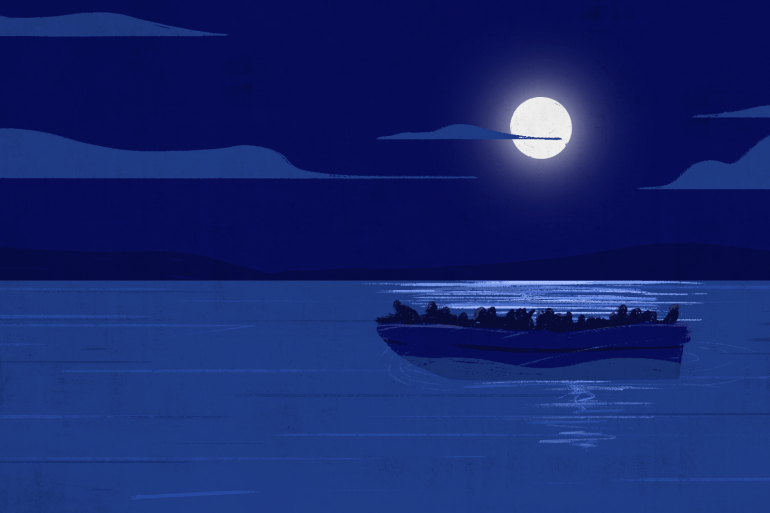‘Not French enough’: What it means to be an immigrant in France
Becoming an immigrant means assuming a composite identity. But what happens when the new culture you embody sees itself as superior to your original one; when integration means little more than being kneaded into a homogenous whole?

“Zinedine Zidane.” The words boomed from a young man’s throat and, triumphant, he looked around the room for approval. “Be serious,” said our trainer for the day, who repeated the question: “What are the symbols of France?”
The rest of us now ventured answers with hopeful seriousness and hopeless tepidity. Eiffel Tower? Wine? Baguette? “Non, non, non,” said monsieur, his patience running thin. “Symbols! The official symbols!”
Keep reading
list of 4 itemsFrance’s controversial ‘separatism’ bill: Seven things to know
Generation Identity: France begins shutting down far-right group
France summons Pakistan envoy over criticism of ‘separatism’ bill
The only symbol we could offer was one of resignation and defeat. Silence. We had no answers. Not the correct answers, anyway. We had disappointed monsieur, who was forced to share the obvious knowledge that had eluded us: the French flag, Marianne, la Marseillaise, the Gallic Rooster …
That winter morning in 2019, just a few minutes before this quick introduction to French heraldry and peevishness, I had arrived at a building in the southeastern city of Grenoble, groggy but amused. The small reception hall was filled up with others – new immigrants like me, as well as longtime residents still stuck in the welter of the system. For now, pressing matters of state lay ahead of us: we were here to fulfil our obligations under an integration contract we had signed with the French government on an earlier occasion.
I had set foot in the country five months earlier on a spousal visa, five years after being married to a Frenchman. Marriage was a good enough path towards integration into a new culture, I had thought, but the French state did not seem to concur. So here I was, sitting in a windowless conference hall attending a two-day workshop on how to integrate well in France. The formation civique or civic training is a rite of passage to acquire the right to stay long-term.
Once settled, our trainer delivered a brief speech. He was the emissary who would relay to us France’s history, principles, ideals and the institutions that govern the French republic. A week later, on day two, the republic would reward our patience with a session on practical aspects of life and employment.
He came across as genial, our trainer, and earnest. So earnest that one could never accuse him of being inspired by anything other than his own belief in the country’s superlative greatness. He laughed and was stern in equal measure, peppering his lectures with his own personal experiences. Himself an immigrant from the Republic of the Congo, he was a poster boy of acquired Frenchness. His French was a treat. He sang France’s praises. He exuded a breezy self-confidence. His voice rose and fell as he inhaled and exhaled aloud in emphasis.
Then it fell upon us aspiring loyalists of the French republic to introduce ourselves. Most, if not all, of us 16 attendees were legatees of erstwhile European imperialism. Francophone people from Tunisia, Algeria, Cameroon and the Republic of the Congo were in the majority. There was a gentleman from the Democratic Republic of the Congo, survivor of Belgian colonialism. And there was me, an English-speaking Indian by-product of the British Empire.
With the introductions out of the way, it was time to get down to work. Monsieur threw a fusillade of questions at us to test our existing knowledge about France: the size and location of the mainland, the outer regions and islands, the administrative organisation of districts and so on.
He showed shades of irascibility at wrong answers, but to be fair, monsieur attempted humour, too. He listed the domains of the country’s soft power – economics, diplomacy, language – and hard: “France is a military power,” he said, laughing, “so think twice before declaring war on us.” The joke did not go down well.
“What about the time when Algerians were used as foot soldiers in French wars?” someone asked, to which monsieur replied: “How can you bring this up here? This is civic training to help you integrate better. These are not history lessons.”

Monsieur did embark on a history lesson of his own. “The history of France is long and complicated, so listen carefully,” he said in the tone of an engaging storyteller. Animated, he took us on a time-lapse adventure from antiquity to the Middle Ages to the present moment. Important personages flitted in and out of his narrative: Clovis I, the 5th century king who made what would become the future France a Christian nation; Francis I, who made French the official language; Jeanne d’Arc; Henry IV and so on. The list of monarchs was long, cut short by the grace of the guillotine. The French Revolution was one of the most significant pitstops in the country’s tangled past, we were told, followed by the Declaration of the Rights of Man and of the Citizen, the abolition of slavery, women’s suffrage, the end of the Algerian War and the decolonisation of Africa.
Monsieur devoted a large chunk of the day to a French Revolution legacy that forms the bulwark of national identity today: the slogan of liberté, égalité, fraternité (liberty, equality and fraternity). This identity was not complete, we understood, without the cornerstone of laïcité, the unique brand of French secularism that has sparked many fires in recent years. Finally, he reminded us that France was a country of immigrants, many of whom, like Albert Cohen, Marie Curie, Guillaume Apollinaire and Patrick Bruel, soared to peaks of fame.
Fundamentals instilled, monsieur divided us into groups of two and asked us to download an app. The words, Let us together live by the values of France, flashed on our phone screens, the French tricolour fluttering over a group of motley people of colour.
Unbeknownst to us, we were being primed for a test, which – if we passed – would earn us a certificate of successful completion of day one – an essential document for future bureaucratic proceedings. The test was also an exercise meant to drill certain basics into our foreign but malleable minds. My partner was a Tunisian named Marwan.
Our groups were little democracies, monsieur told us. “Debate and vote to choose one answer.” Mindful that a two-people democracy could easily turn into an autocracy, Marwan and I consulted each other before clicking the answers, most of which we got right. We agreed that: the French territory is cleaved into regions, departments and communes; France is a democracy, so power comes from the people; one can choose any religion or not to have one; women have the same rights as men; taxes on one’s income contribute to public services; one can vote after 18 years; polygamy is illegal.
No discussion was needed for the final question: To know and understand a local culture helps to integrate better. True or false?
I had rights, I had responsibilities
My journey towards integration began, it seems, not the day I married a Frenchman, but when I first visited the French Office for Immigration and Integration a few months after arriving in France. Having presented my passport and visa, I was ushered into a room full of people. Here, I took a French test. I matched drawings with corresponding phrases; read a text and answered related questions; wrote a letter; did grammar exercises. Next, I was called for an interview, where my oral skills were put to the test. A medical exam followed.
All barriers crossed, I signed a “republican integration contract”. I had rights, but I was also bound, on my part, by duties and responsibilities, which included learning French and attending a civic training workshop with “assiduity and seriousness”. I was beholden to “respect the values of French society and the French republic”. If I fulfilled these conditions, I would be granted a residence permit.

As immigrants, we inhabit composite identities made up of the small worlds and great distances we have traversed, left behind, and if lucky, return to now and then. As we grow in our new ecosystems, we do not shed our skin; instead, we elide onto our person, layer upon layer of discoveries and delights. Enriched by addition, not shrunk by subtraction, we press towards harmony between different, often divergent worldviews. But what if we are made to feel that the local culture we now embody is superior to our original, foreign one? And to be integrated means to be kneaded into a homogenous whole?
In France, the question of integration became increasingly politicised during the 1980s, even though France had long been a country of immigrants. In the late 19th century, it welcomed people from neighbouring countries like Belgium, Italy and Spain. Before the second world war, there were waves of immigration from Poland and Italy. In the post-war years, individuals and families poured in from Spain and Portugal.
“The idea back then was of assimilation. The general perception was that people would stay long enough, forget about their roots and become French,” said Thomas Lacroix, a researcher from the French National Centre for Scientific Research. He works on the relationships between transnationalism and development, with a focus on North African immigrants.
It was after the decolonisation of Algeria in 1962 that the dynamics changed. Algerian migrants, as well as those from other former colonies in the sub-Saharan and North African regions, and in Asia, streamed in for permanent settlement. Over the years, the colours of French immigration diversified and deepened.
In recent times, integration has become a European question. “The European Union sees it as a two-way process. This means society as a whole must develop tolerance towards immigrants. But immigrants also have to learn the values of the country and the language,” said Lacroix, adding that voters started demanding that immigrants acquire a basic level of cultural norms and values of society. “This is why the authorities have proposed workshops such as civic training for immigrants,” Lacroix said.
This sentiment was borne out to some extent by a 2019 poll conducted by Ipsos, a well-known research firm. Half of the respondents saw foreigners as a threat to French values, while 46 percent thought they posed a risk to the economy. Sixty-eight percent believed, however, that if integration did not work well, it was because “people of foreign origin aren’t provided with the means to integrate”.
Liberty, equality, fraternity
Like Earth’s shifting plates, we, too, have been constantly on the move, our movements long preceding the sovereignty of boundaries and walls. We have exchanged, merged and grown. The political systems of today, however, have fenced us in rigid definitions of who we are based on accidents of birth and nationality. Where we come from indicates where we will be permitted to go, and how we will be received.
Once in the new land, we stumble at first as a dominant, well-codified culture reigns supreme, allowing into its fold only those who play entirely by the new rules. In an era of restrictions and borders, we are tempted to forget that everyone has the right to live as they wish. “As long as that right does not involve depriving other people of their right to live as they wish as long as … ad infinitum,” said Tabish Khair, author of the book The New Xenophobia. “This right applies to what is defined as ‘French’ just as much as what is defined as ‘Indian’ or ‘Maori’ or ‘Santhal’. However, in some, or all, cases, the descriptions are themselves prescriptive and partly constructed. Which means that they are based on fixing the way a people ‘ought’ to live and then imposing it on some other people.”
In France, the singular idea of what it means to be French is the plank on which far-right politicians have fought elections and thrived. Populist leaders, in recent years, have drummed up a chorus that the soul of France is being eroded by Muslims of former colonies. What is this soul?

Simply put, the essence of Frenchness rests on the troika of liberty, equality and fraternity. It is so central to the country’s character that you see it emblazoned everywhere – on monuments, postage stamps, coins, in school buildings and government offices. And yet, while pluming itself as one that champions these republican values above all, France remains twisted in a skein of injustice, inequality, and exclusion towards immigrants and people of colour.
How did this noble republican model of values degenerate into a powder keg? Originally conceived for white, Christian people, it simply does not hold up in contemporary France made up of plural realities, say scholars and historians.
If “new” immigrants of colour, even several generations down, are relegated to the margins, this follows from France’s long tradition of papering over differences. “For instance, we didn’t let Bretons be Bretons or Auvergnats be Auvergnats. They had to be French first,” said Jérémie Gilbert, Professor of Human Rights Law at Roehampton Law School. “Believe it or not, the idea of equality at all costs has actually been used to oppress minorities. By pretending we are all equal, politicians can ignore the fact that minorities exist,” Gilbert said.
In the name of equality, the country does not collect racial, ethnic, religious or linguistic data. This, he explained, makes minorities invisible and deprives them of any affirmative action. “In stressing on equality, we seem to have forgotten about fraternity. What about people’s right to be different?”
At the dawn of the new millennium, policy decisions began to pull at these different threads of social fabric. The display of “ostensible” religious symbols, like headscarves, was banned in 2004, in the name of secularism. A year later, major riots broke out in the suburbs of Paris and other cities across the country. Youth from sub-Saharan African and Maghrebin heritage were at the forefront, calling attention to years of intolerance towards immigrants, especially French Muslims, who make up about nine percent of the population. Five years down the line, in 2010, a law banning face coverings in public spaces brought them to a boil.
Following the 2015 attack at Charlie Hebdo, a satirical weekly, France has flared up in a series of acts of “terrorism” carried out in the name of Islam. In September last year, a man attacked two people with a meat cleaver outside the former office of Charlie Hebdo. Inveighing against “Islamist separatism” in a potent speech days later, President Emmanuel Macron set the stage for a hugely controversial anti-separatism bill. Within two weeks, Samuel Paty, a schoolteacher in a Parisian suburb, was beheaded for showing his students cartoons of the Prophet Muhammad to explain freedom of expression. A few days later, a knife attack at the Basilica of Notre Dame in Nice killed three people and injured several others.
Last month, French members of parliament approved the anti-separatism bill, also called the bill to “reinforce republican principles,” after two intense weeks of debate. The legislation perceived as anti-Muslim has led to protests in France. While Prime Minister Jean Castex has said that the legislation is not against any religion, experts see this as Macron’s way to wheedle himself into the voter base of the far-right candidate Marine Le Pen, with whom he is level pegging in the polls. The first round of the French presidential elections will be held in April 2022.
Not French enough
Immigrants are told, learn our language and be like us. In France, much of the national character is tied up with its historical linguistic hegemony, leaving immigrants vulnerable to discrimination in the job market and other situations.
Take, for instance, my acquaintance Ayman (name changed to protect his identity), whom I met in a language group in Grenoble run by a local non-profit organisation to help adult immigrants, asylum seekers and refugees learn French, free of cost. Ayman, a refugee from South Sudan, had crossed the Mediterranean on a rickety boat, which at some point could not hold the weight of all the people on board. Fortunately, a larger ship rescued them. From Italy, he found his way to France. By the time I knew him, he had spent about three years building his life from scratch. A truck driver back home, his application to be a bus driver was rejected in France, because his French was not good enough. He spent long hours at a state-sponsored intensive French class, while also toiling at a cycle repair shop.
Khair, the author of The New Xenophobia, says an immigrant or refugee cannot be expected to speak a language learned at the age of 20 or 40 with great fluency. “But I am in favour of an immigrant’s children being provided extra language training, if required, as long as the system does not use this to make them feel inferior – which often happens.”
Learning the language, however, does not always guarantee integration, as is experienced by young third or fourth generation immigrants in France’s banlieues – suburbs of large cities – and their environs.

When my husband and I moved to Grenoble, we were especially warned to steer clear of the district of La Villeneuve, translated as “the new city”. It was an urban planning experiment in the 1970s, a mixed community project envisioned as a riposte to ghettos in big cities like Paris, Marseille and Lyon. Social mixing with public and private housing, including subsidised apartments for low-income families, was seen as an antidote to exclusion. The neighbourhood was self-sufficient with schools, a park, grocery stores and a lake.
For a while, the idea seemed to have worked: people from varying social echelons lived together in peace and concord. But soon, the utopian dream began to fray at its edges. In 1983, the newly elected right-wing municipality changed the housing policy in a way that the neighbourhood attracted only low-income families in great difficulty. Just when it required social support, none came their way, said Grenoble urban planner Maïlys Toussaint in an interview with the BBC. She said that many people blamed the downfall of Villeneuve and neighbouring Arlequin on these policy changes. The middle classes had already begun to move out to the city centre, and the estate came to be dominated by immigrants steeped in poverty and unemployment.
In 2010, La Villeneuve rose to nationwide infamy. Riots erupted after police shot dead a young man of North African origin suspected in the armed robbery of a casino. For days, rioters took to the streets, setting cars on fire. By this time, the community had spent years feeling neglected and let down. What followed was seen by many as a tactical political gambit. With general elections two years away, then President Nicolas Sarkozy arrived in Grenoble a few days after the violence, and in an incendiary speech, became the first president to explicitly link immigration with crime.
France was seeing, he said, “the consequences of 50 years of insufficiently controlled immigration, which have ended in the failure of integration. We are so proud of our integration system. Perhaps we need to wake up … It worked. It doesn’t any more.”
Far from the ideals from which it was born, La Villeneuve, today, finds it hard to shrug off the image linked to 2010. Not exactly a banlieue, though the cycle of poverty and unemployment – and their attendant problems of drugs, violence, and petty crime – continues. Because of their address – residents told Le Postillon newspaper – they are stigmatised and denied job opportunities.
At the height of the COVID-19 pandemic last year, the locality shot to attention once again. The world watched, with trepidation, a viral video of two boys jumping from a burning third floor apartment and landing safely into the outstretched arms of seven strangers. Each of the men suffered varying degrees of injuries from the force of the fall. Each of them was an immigrant. For the brave rescue mission, the mayor presented them with medals of honour.
Proof of integration
Without swashbuckling acts of bravery and altruism, simply putting one foot in front of another, and staying clear of trouble, is not enough. Immigrants often bear the burden of having to prove, again and again, that they are worthy of their spot in the crowded real estate of the “first world”. To be accepted and honoured, minorities are obliged to rise above and beyond the standards held for “original” dwellers.
At the end of my civic training, I wondered if all this talk of integration – well-meaning in and by itself – was, after all, France backsliding into the hoary armour of its “civilising mission”. I asked my friend Vaidehi, what she made of her experience attending a similar session in Metz. She, too, is an Indian woman married to a Frenchman. “It was as though we were being told, ‘this is how we do things here, deal with it’. There was no intercultural dialogue, and it did not really probe multiculturalism,” she said.
After my training, one thing was clear. Inside the classroom, France was an all-embracing country, blooming with opportunities. Outside, it laid gruelling demands on those it deemed as outsiders.
“I have lived here for several years. What else do I need to do to prove my integration?” a woman at the training said to me in perfect French. “These workshops are all well and good. But will we get jobs with our Muslim names on our CVs?” asked a young man.
My experience with acquiring residency in France was nowhere as agonising as that of the people I met at the training. Most foreigners begin their stay in France with a one-year permit, renewable annually or bi-annually. At the end of five years, they can apply for a decade-long permit, or citizenship. I had been married long enough to a French citizen to be able to jump through the hoops and apply directly for a 10-year permit. I was also fortunate to have studied French long before I imagined that I would, one day, live in France. Rules were tight but my dossier was tighter, I thought.
However, I was still at the mercy of someone at the prefecture, who would decide if I was integrated enough. I signed a declaration of commitment to make my case:
I, the undersigned… declare on my honour that I commit to respect the values and principles governing the French Republic… I am aware of the fundamental principles of the French Republic which are stated in its motto: “Liberty, equality, fraternity” as well as its democratic and social characteristics, indivisibility, and secularism. I am committed to uphold them in my daily life.
Declaration in hand, I set out for my appointment. Dossier submitted, questions answered, the wait began. Two months later, I collected my permit. I had finally earned it – the tacit, if not fervent imprimatur of the republic.